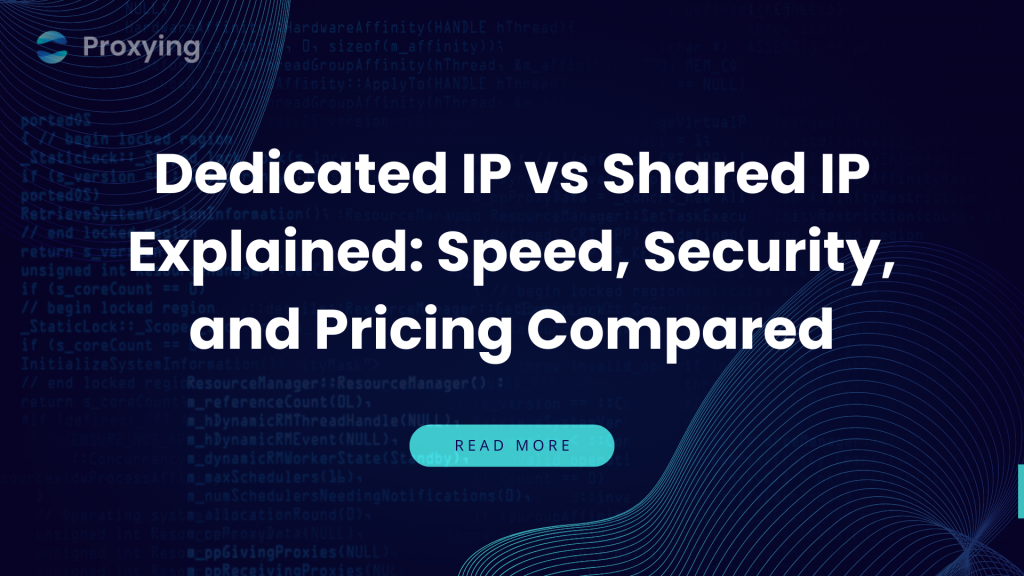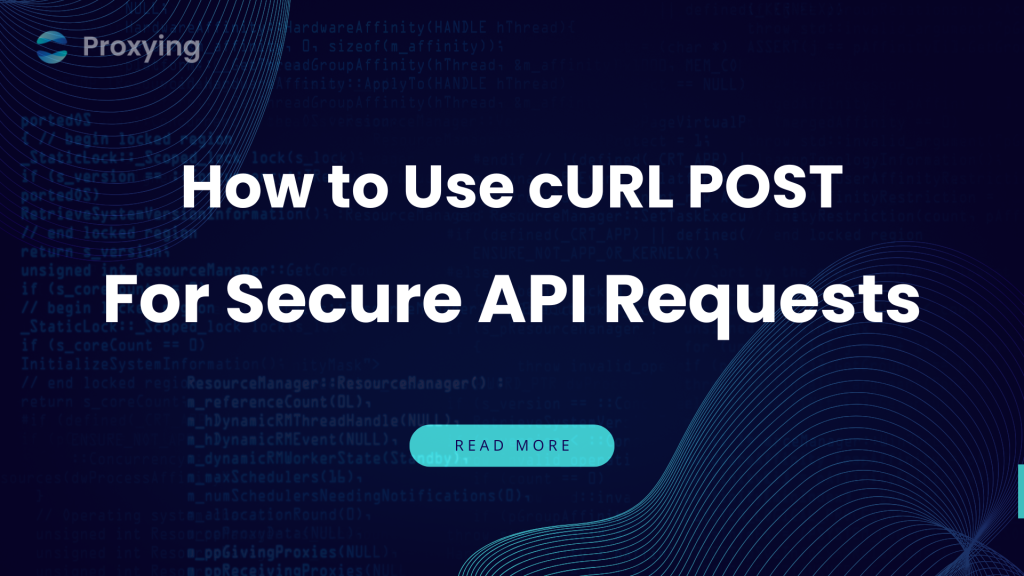Dedicated IP vs. Shared IP: The question of whether to choose a dedicated IP address or a shared IP address for web scraping can be quite controversial.
This issue arises due to the abundance of incorrect and outdated information on the web regarding dedicated IPs and how they work. Well, in short, you don’t even need a dedicated IP in 99 percent of cases.
In this guide, we will go through what a dedicated IP and a shared IP are, their pro and cons, their use cases, and some of the major differences between them.
What is an IP address?
IP stands for Internet Protocol, and it is a unique numerical label assigned to every device connected to a computer network, such as the internet, allowing them to send and receive data. IP addresses are important for the internet’s functionality, enabling communication and data exchange between devices by providing location and identification.
IP addresses are an essential part of the Domain Name System (DNS), a system that translates and associates domain names with their designated IP addresses.
When a visitor enters a website’s domain name, their internet service provider checks if its domain name resolution contains the IP address record for the domain.
Without the DNS system, we would be forced to enter complex IP addresses into our browsers instead of user-friendly names.
What is Shared IP?
Shared IP refers to multiple VPS instances sharing the same external IP address. While each VPS shares this IP address, it is an independent virtual server. A shared IP is quite common nowadays with many hosting providers. This usually happens with shared hosting providers for WordPress that use cloud-based tech.
What Are the Pros And Cons of Shared IPs?
Pros
- The primary advantage of shared proxies is that they are affordable, as the cost of proxy IP is divided among many users.
- Shared proxies are suitable for general web browsing, crawling, and simpler web scraping tasks.
- They often provide access to a wide range of IP addresses and locations, which can be used to access the geo-restricted websites.
Cons
- They provide a slower speed as multiple users use the IP address, and bandwidth, performance, and response times can be slow.
- An IP address used by multiple people is more likely to be flagged and banned,
- Multiple users’ presence can increase security risks, as you don’t have a dedicated IP address.
- The actions of other users can negatively impact your experience and reputation, as one IP is shared among many users.
How Does a Shared IP Work?
A shared IP address works like any other IP address; it enables data exchange between two destinations. As shared IP addresses are rotated among a large pool of users, external websites cannot differentiate between the devices and users accessing them through the same pool of IPs.
These can cause some problems, as:
- Hindrance in identifying a specific device: When multiple devices share the same IP address, it becomes difficult to identify a specific device, causing a problem or engaging in suspicious activities.
- Reputation: If any of the devices using the shared IP address engage in suspicious activity like spamming or phishing, it can result in a ban of the whole shared IP address pool. This can impact the reputation of other devices in the shared pool.
- Performance considerations: Well, in a usual situation, sharing an IP address doesn’t affect your internet speed. But sharing an IP with multiple devices will use the same network resources (e.g., bandwidth or server capacity), which can lead to slower response time.
However, at the start, each device or user on the same shared IP address will have a unique internal IP address. A process known as Network Address Translation (NAT) is used to translate between the external shared IP address and the internal IP address of each device.
What is a Dedicated IP?
A dedicated IP address is an IP address that is assigned to a single device rather than shared between many users or devices. It is obtained through an ISP, VPN, or proxy server. These are commonly used for secure remote access, email delivery, and other specialized networking needs.
This can be useful where businesses need control over their data, as IP contains a lot of data, and they can also reserve resources for some approved IPs, reducing security gaps and reducing the risk of unauthorized access.
What Are the Pros and Cons of Dedicated IPs?
Pros
- They provide the entire server’s bandwidth to a single user, preventing slowdowns and ensuring faster, more consistent performance.
- A dedicated proxy isolates you from other users, increasing privacy and reducing the chance of getting an IP banned.
- Since you control the IP’s usage, it has a better reputation, leading to more uninterrupted sessions.
- It is ideal for high-demand tasks like SEO monitoring, ad verification, managing multiple accounts, and scraping large amounts of data where speed and consistency are essential.
Cons
- Well, they cost more than public proxies because of their high speed and more anonymity.
- They offer a more limited number of locations or unique IP addresses for dedicated proxies.
- For users, managing a larger number of private proxies can be challenging as they require a lot of technical expertise.
- Whiprovidersder provide proxies at multiple locatiobut it still will be less diverse than shared proxies.
How Does a Dedicated IP Work?
These IPs are assigned to a specific device or a user instead of being shared with many users. But the disadvantage is that dedicated IPS are usually expensive than shared ones. However, they offer full control over the network. For example, the admins of the network can preserve some resources by allowing some IPs to access them, minimizing the security risks and reducing the chance of data loss, as only matching IPs will be allowed. Moreover, having a fixed IP drastically reduces the chances of getting blacklist and minimizes the number of CAPTCHA users have to go through.
Dedicated IP vs. Shared IP
Now we have understood what both IPs are and how they work. Let’s dive into a comparison of dedicated and shared IPs.
Risk of Blocks
The difference between a shared IP and a dedicated IP is how likely you are to get blocked while web scraping and automating. Well, when you are using a shared IP address for web scraping, the chances are significantly higher than with a dedicated one because more than one user is likely to send requests to the same website at the same time, which can lead to blacklisting that IP address pool.
Speed
When it comes to web scraping, all users look for speed because everyone wants their tasks to be done quickly. Dedicated proxies are usually faster than shared ones because you don’t have to share IPs with other users. They have no bandwidth limitation and have high uptime.
However, it is important to know that shared IP addresses can be faster than dedicated ones. It depends on how many users are using the same IP address and how intense the traffic is.
Security
Dedicated proxies are also known as private as they are not shared, and they are usually secured by protocols, HTTP, HT, TCP, or SOCKS5. If you get dedicated proxies from a reliable IP provider like Proxying, you can be sure that your personal information won’t get leaked, and it will stay encrypted.
Control
When you have control over your IP addresses, the chances of getting blocked are reduced. As you know, no one other is using your IP, and now you are in charge of what websites you are going to scrape in your own way.
This control is provided by dedicated proxies, as each IP address is dedicated to only one device. So, dedicated proxies provide more control over your network than shared ones.
Pricing
When it comes to price comparison of dedicated IP vs shared IP, dedicated proxies are way more expensive than shared ones. They are expensive due to the cost of maintaining the dedicated proxies’ server. On the other hand, shared proxies are one of the cheapest proxy solutions available in the market.
Target Website Type
For websites which doesn’t have high security, shared proxies are ideal for scraping them. In other words, you won’t be impacted by other people using the same IP while scraping these kinds of websites.
Another scenario when shared proxies can be used is when the targeted website allows you to scrape the information.
Dedicated proxies are recommended when you are trying to scrape a website that takes intense security measures because they provide high anonymity and location spoofing.
Conclusion
In the end, dedicated IP addresses seem to be the obvious choice, but it all depends on your needs. If you are looking for more privacy and cost isn’t an issue, you should go for dedicated IP addresses, but if you are looking for something more affordable, shared IP addresses are your way to go.




